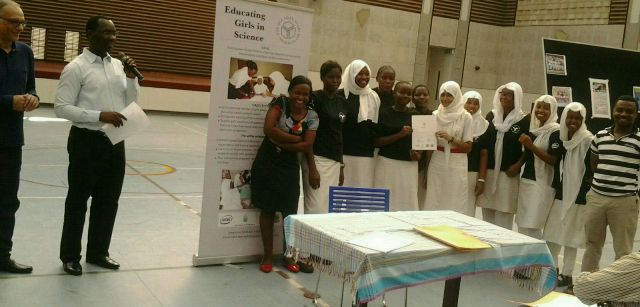Students at Coast Girls School have developed a small black stone that is saving lives following snake and scorpion bites in Kongowea and Likoni in Mombasa County, through a school project led by Aga Khan Academy, Mombasa, and supported by Intel and the Aga Khan Foundation (USA).
Educating Girls in Science (EGIS) is a two-year pilot project launched by the Aga Khan Academy, Mombasa, in 2014, to empower girls by increasing their engagement in science and in applying their knowledge outside the classroom to benefit their community.
“Working with teachers, students and science clubs, we are using the Educating Girls in Science project to train girls how to use knowledge in science for problem-solving and not just for the exams,”
said Lucy Mwandawiro, the project’s coordinator and a teacher of chemistry at the academy.
The black stone, or viper stone, is a piece of processed bone made from the thigh bone of a cow used as a first aid measure for snake, scorpion and insect bites. Following training at the Aga Khan Academy, Mombasa, and intensive work with the academy’s project team, the girls conducted a community survey that found residents from the two areas were facing an ongoing challenge from snake and scorpion bites. Getting effective first aid and timely medical treatment was difficult because the communities are located a long way from hospitals.
In 1997, the Ministry of Health conducted a survey that showed that up to 30 per cent of snake bite incidences end in fatalities, because patients do not get timely first aid.
It was this need that saw the 25 girls from Coast Girls School base their project around ways of treating snake bites. On presenting the idea to the EGIS judges during the final project presentations at the Aga Khan Academy, Mombasa, in June this year, the students were provided with the financial and technical support to develop the stones for wider use.
The black stone is made by cleaning, drying and baking the thigh bone in order to increase its surface area and make it more absorptive. Traditionally, the black stone was prepared from any animal bone and left to cool in open air, a factor that re-oxidized the stone and reduced its absorptive ability. The girls improved on this method, using the thigh bone due to its highly porous nature, and cooling baked bones in an air tight container, in order to preserve their absorptive power.
Once prepared, the black stone neutralizes the fatal effects of a snake bite by soaking up the poison at the entry point. It is used by making a small cut on the bitten area until blood comes out and then placing the stone on the skin. The stone then absorbs the poison through capillary action reducing the fatality of a snake bite.
The Likoni and Kongowea residents are taking great interest in the stone. The few who knew about them thought they were a form of magic. But the Coast Girls School students are getting the residents to change this mindset by explaining to them how the stones work scientifically. They also found that some of the stones being sold in the areas were of poor quality so the girls are also embarking on the process of training people on how to make the stones more effectively.
They see this as a good way to give back to the community. The stones are cost-effective for the residents, since they can be re-used several times. Previously, residents would consult local healers who charged them up to Sh2,000 for each snake bite treatment, but the girls are empowering the communities to make the stones for themselves, as well as giving the first samples for free. After use, the stones are boiled in salty water, soaked for several hours in fresh milk and then dried again to restore the stones’ absorptive nature.
Coast Girls School is one of the 24 schools that Aga Khan Academy, Mombasa is working with to solve community-based problems using classroom science through the EGIS project. The project started with nine schools in Mombasa County in 2014, but extended to Kwale County in August 2015 where it is now working with 15 schools.



Great! such innovations should be encouraged, integrated and employed for the service of many.